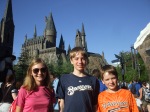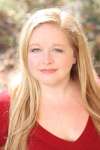How does one save money when attending a conference and bring the family along for a vacation? Tent camping, of course.
Last week, I attended the Historical Novels Society 2013 conference in St. Petersburg, Florida. My family tagged along so we could turn the trip into a vacation.
Day 1: We left on a Wednesday, drove about 12 hours, and camped at Lake Barkley State Resort Park in Kentucky. This is a beautiful park and was practically empty. We arrived just before sunset and took a short hike to the lake. The beach was clean and pretty, we couldn’t understand why nobody was there. Tom figured it out.
Day 2: Drove for about 15 hours and arrived in St. Petersburg about 10:00pm, so had to set up our tents in the dark. We stayed at the St. Petersburg/Madeira Beach KOA and had a beautiful tent site–right on the water, in a quiet park of the campground. This was a well-run, quiet campground–probably much busier in the winter. In the heat of June, there were not many other campers. Here’s our tent site:
After setting up camp, I couldn’t help but imagine an alligator climbing up out of the water and coming at our tents. Here’s a close up. The water is just beyond the line of bushes.
I spent a sleepless night, jumping every time there was a splash in the water, wondering if alligators were noctural or diurnal and comforting myself with the thought that alligators probably lived in fresh water and the lagoon by us was salt water. Right? I’m happy to report that we did not see a single alligator on our trip.
Day 3: After a camp breakfast, we got on our swimsuits and drove the 5 minutes to Madeira Beach. June is a good time to visit the beach in Florida, as the heat makes it necessary to get in the water and tourists are not in attendance. Here is what the beach looked like at 10am on a Friday morning:
That night, the conference began. It was held in the beautiful Vinoy Renaissance Hotel.
I got to meet up with the Great Lakes Chapter of the HNS and to listen to Anne Perry speak at the dinner banquet.
My family went to visit Fort DeSoto. They found the fort interesting, but the heat was disabling and distracting. They finished the day with a meal at Pepe’s Cuban Cafe, which they called the best meal they’d ever had.
Exhausted, I fell asleep immediately, despite sleeping on the ground, possibly within striking distance of an alligator.
Day 4: All day at the conference for me. I volunteered at the agent/editor pitches, went to some fun workshops and did a book signing in the afternoon. Here I am with fellow authors Tinney Heath and Julie Caton at the book signing.
My family picked up a cousin and headed to Busch Gardens, where they rode roller coasters, got sunburned, and drank 2 gallons of water each.
Day 5: Last day of the conference. I went to Susanna Kearsley’s workshop on Bringing Characters to Life through Genealogy. It was exciting to get to listen to one of my favorite authors. Kearsley used the family tree of character/real person John Moray (The Winter Sea) to show how an author can better understand the relationships between historical people and make realistic families for fictional characters. Fascinating! I learned a lot.
My boys went to the beach one last time, then we packed up camp and drove to Orlando to see my cousin and her family and to sleep in beds!
Day 6: Disney!
My boys had never been and I hadn’t been since I was about ten. Hot day, but endurable as many of the rides at Disney have lines in air conditioning. My cousin’s daughter helped guide us. I was worried my boys, ages 13 and 17, would be too old for Disney, but we all had a good time. Space Mountain was the most popular ride for us. We finished with a late dinner at Tijuana Flats. Yum.
Day 7: Universal Studios, Islands of Adventure.
My boys liked this park better than Disney or Busch Gardens. It gets my vote too, as the Harry Potter ride is quite possibly the coolest thing I’ve ever done. Highly recommended. Also, the butterbeer is a must drink. My cousin and her daughter both came with us, and they were a lot of help maneuvering through the park. Single rider lines are the way to go, even if you are in a group. You get through the rides much more quickly and don’t get separated too much.
At both Disney and Universal Studios, we rode rides with Brazilian teenagers sporting colorful Kontik shirts. We learned eventually that Kontik is a travel company and that their group consisted of 700 Brazilian (rhymes with a million) teenagers.
Day 8: We got up early to drive the 18 hours to Bloomington, Indiana, arriving a little after midnight. Tom read The Fault in Our Stars in its entirety. Craig continued with the Song of Ice and Fire series, and I read most of Gillian Bagwell’s The Darling Strumpet. Andy was a driving machine.
Day 9: Stayed with the my sister and her family. My brothers and their kids came to visit too. Great to see everyone, talk, eat, ride horses and play with chickens.
Day 10: An 8.5 hour drive never seemed so short. We got home in time to pick up our dog from the kennel.
Great vacation. Great to be home.





















